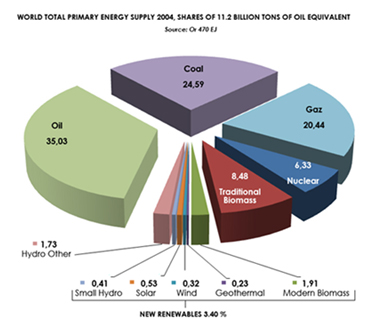Energies of the 21st Century
10 May, 2007 06:59 pm
The debate over energy resources used by modern societies is of the utmost urgence. Not so much because the traditional forms of energy will run out, but because they more than ever raise concerns. The primary concern is economics. With the price of oil floating between $60 and $70 a barrel (around ?50), other forms of energy, new and old, have become financially attractive. Next are political and ecological concerns. It is no longer possible to look the other way concerning the damages on the environment from greenhouse gas emissions, due to the combustion of fossil fuels.
The International Energy Agency recently estimated the world�s oil reserves to be about 2.6 trillion barrels (1.1 trillion barrels of which are proven). With world wide consumption at 30 billion barrels, with an annual growth of 2%, oil resources may cover our needs for the majority of the 21st century (even though this remains widely debated)�
 In addition, the gas market is in full mutation. The liquefied natural gas (LNG) technology enables the transportation of gas by ship, avoiding transportation by a gazoduc. Finally, the use of coal, a resource largely available throughout the world, notably in countries with strong economic growth like China, could increase in the coming years.
In addition, the gas market is in full mutation. The liquefied natural gas (LNG) technology enables the transportation of gas by ship, avoiding transportation by a gazoduc. Finally, the use of coal, a resource largely available throughout the world, notably in countries with strong economic growth like China, could increase in the coming years.However, geopolitical instability and political pressures applied by ecological lobbies and public opinion, more and more aware of Climate Change, constitutes a real restraint against the usage of fossil fuels. In August 2005, the United States adopted the Energy Policy Act encouraging alternative energy development through tax incentives and loan guarantees. More recently, in March 2007, the members states of the European Union agreed to increase to 20% the use of renewable energies (out of overall consumption) by 2020.
Renewable energies are energies derived from resources that are regenerative or for all practical purposes cannot be depleted. These include: hydraulic, solar, wind, and geothermal which allow the production of electricity, as well as biofuels (derived from the cultivation of colza or red beets) which are possible replacements to gasoline.
A resort to Nuclear energy, a mature and relatively clean energy, could occur, even though it continues to arouse much reluctance.
Politicians and experts are also interested in measures called �energy efficiency� which consists of minimizing energy waste. In this regard the isolation of buildings represents a promising hope.
This is an entirely new energy strategy that must be built, taking into consideration the uses (a particular type of energy for a specific use), the risks (ecological, geopolitical), and the production costs. Without a doubt fossil fuels will continue to play a central role in the next thirty years, but they will be progressively replaced, not by some new miracle energy, but by an array of different energies of which renewable energies will have an ever-increasing place.
Read more:
Ethanol, a Possible Replacement to Gasoline
Coal, a Future Energy?
3,4%
20%
Translated by Christopher Le Coq
-
12/12/12
Peak Oil is Nonsense Because Theres Enough Gas to Last 250 Years.
-
05/09/12
Threat of Population Surge to "10 Billion" Espoused in London Theatre.
-
05/09/12
Current Commentary: Energy from Nuclear Fusion Realities, Prospects and Fantasies?
-
04/05/12
The Oil Industry's Deceitful Promise of American Energy Independence
-
14/02/12
Shaky Foundations for Offshore Wind Farms







 Read more
Read more